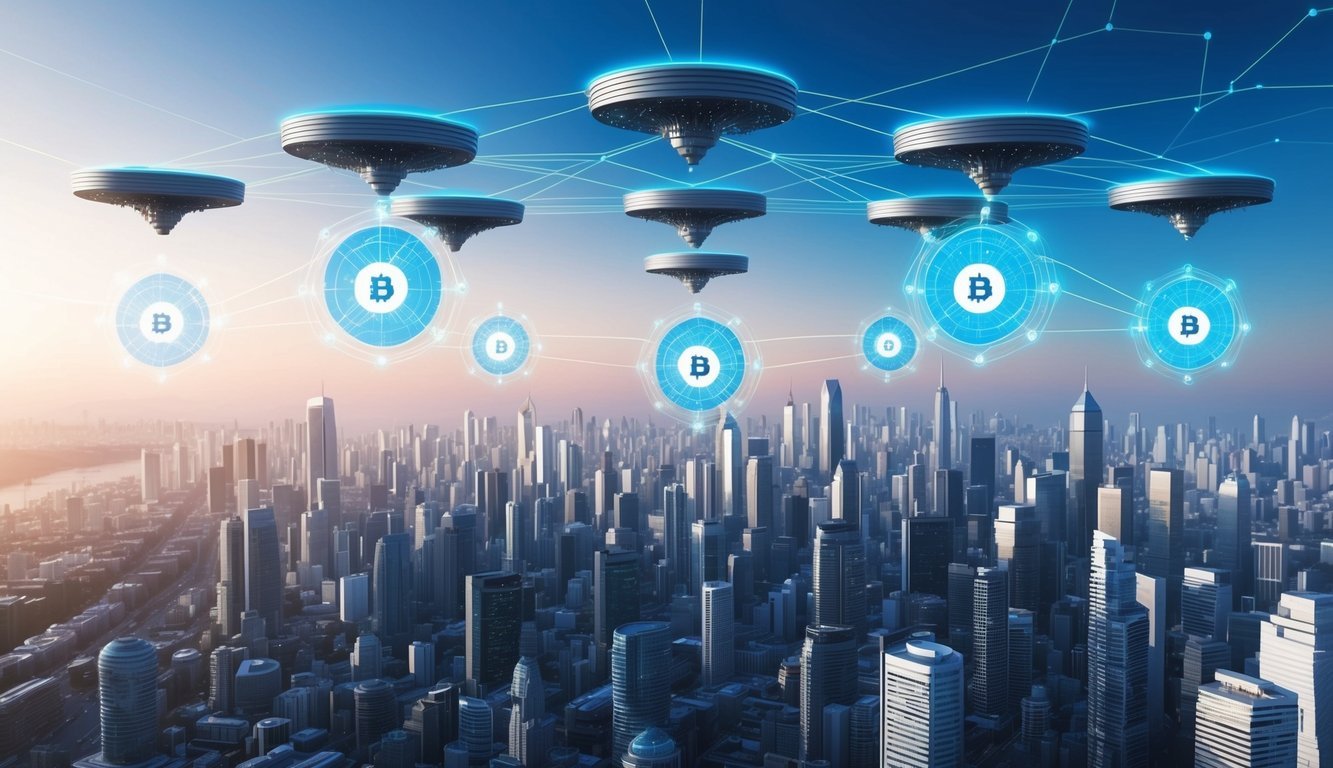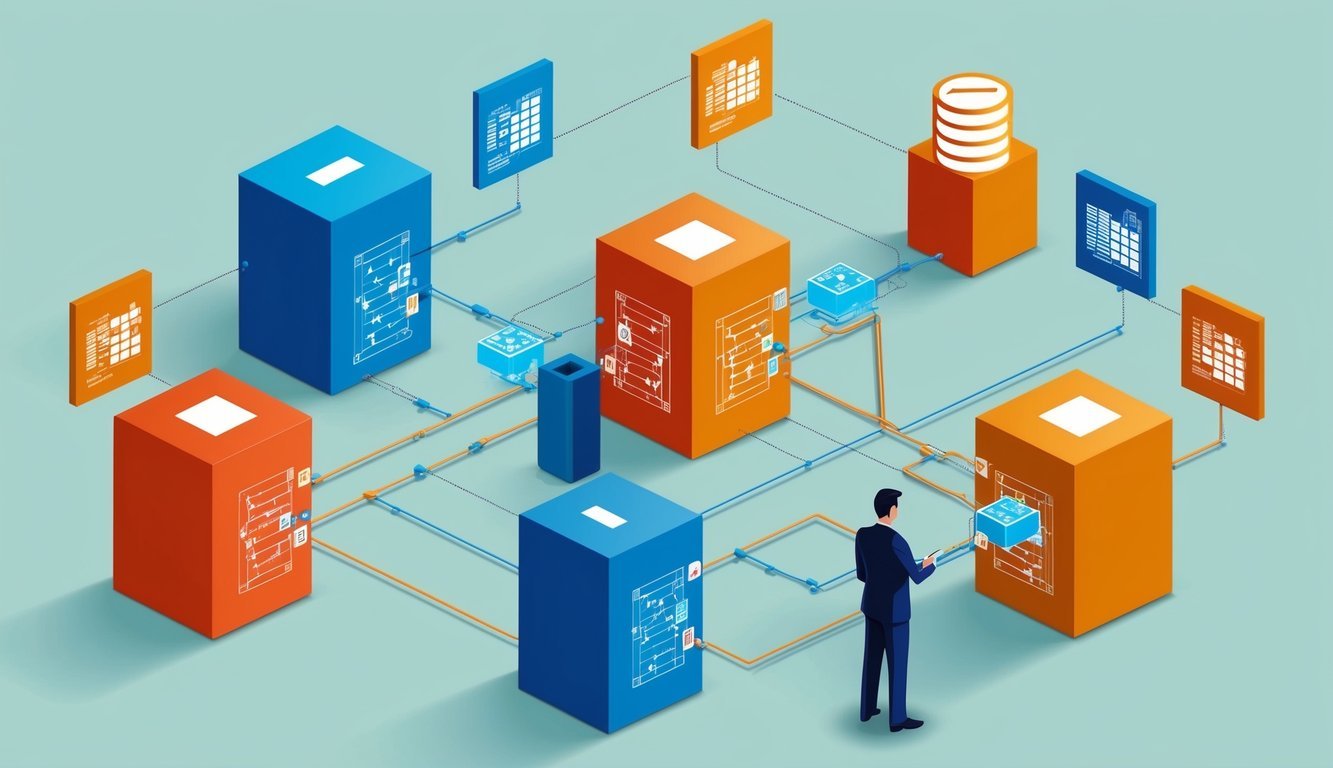Blockchain technology is amazing, but it has some limits. It can’t connect to the outside world on its own. That’s where oracles come in.
Blockchain oracles act as bridges between on-chain and off-chain data. They allow smart contracts to interact with real-world information.

Think of oracles as the eyes and ears of the blockchain. They bring in data from the real world, like stock prices, weather reports, or sports scores. This lets smart contracts make decisions based on what’s happening outside the blockchain bubble.
Without oracles, blockchain networks would be isolated systems. But with them, the possibilities explode. You can create contracts that automatically react to real events, opening up a whole new world of applications for blockchain tech.
Key Takeaways
- Oracles connect blockchains to external data sources
- They enable smart contracts to interact with real-world information
- Oracles expand the potential uses of blockchain technology
Understanding Blockchain Oracles
Blockchain oracles are key players in the world of smart contracts and decentralized applications. They act as bridges between blockchains and the real world, bringing external data into the blockchain ecosystem.
The Essentials of Blockchain Oracles
Blockchain oracles are data feeds that connect blockchains to off-chain information. They help smart contracts access real-world data that isn’t stored on the blockchain itself.
Think of oracles as translators between the digital and physical worlds. They can bring in all sorts of info, like:
- Stock prices
- Weather data
- Sports results
- Election outcomes
Without oracles, smart contracts would be limited to using only on-chain data. This would seriously limit their usefulness in many real-world scenarios.
Centralized Vs. Decentralized Oracles
You’ve got two main types of oracles: centralized and decentralized.
Centralized oracles are run by a single entity. They’re simpler and often faster, but they have a big drawback. If that one source fails or gets compromised, it can mess up all the contracts relying on it.
Decentralized oracles, on the other hand, use multiple sources. They’re more complex but also more reliable. They use consensus mechanisms to agree on the correct data, making them harder to manipulate.
Challenges and the Oracle Problem
The “oracle problem” is a big issue in the blockchain world. It refers to the challenge of ensuring that the data provided by oracles is accurate and tamper-proof.
Here are some key challenges:
- Data integrity: How do you know the info is correct?
- Timely updates: Outdated data can lead to wrong decisions.
- Security: Oracles can be targets for hackers.
To tackle these issues, developers are working on solutions like:
- Using multiple data sources
- Implementing reputation systems
- Creating decentralized oracle networks
Oracles in Action: Use Cases and Real-World Applications
Oracles open up a world of possibilities for blockchain applications. They connect smart contracts with real-world data, enabling exciting use cases across various industries.
Financial Services and DeFi
In the world of decentralized finance (DeFi), oracles play a crucial role. They feed price data to lending platforms, helping you get accurate interest rates on your crypto loans.
Oracles also power decentralized insurance products. Imagine crop insurance that automatically pays out when rainfall data shows a drought. No paperwork, no delays – just instant compensation.
For traders, oracles provide real-time market data. This lets you make informed decisions when using decentralized exchanges or trading platforms.
Supply Chain and Logistics
Oracles bring transparency to supply chains. They can track your shipments in real-time, feeding location data to smart contracts.
Temperature sensors connected to oracles ensure your perishable goods stay fresh. If the temperature goes above a set limit, you’re automatically notified.
Customs clearance becomes smoother with oracle-powered systems. They can verify and record each step of the process, reducing delays and paperwork for your international shipments.
Gaming and Prediction Markets
In blockchain gaming, oracles add an element of unpredictability. They can feed random numbers to generate in-game events, keeping your gameplay exciting and fair.
Prediction markets like Augur rely heavily on oracles. They provide the real-world outcomes that determine your winnings.
Sports betting platforms use oracles to get live match results. This allows for instant payouts when your team wins, without waiting for manual verification.
Integrations and Interoperability
Oracles play a key role in connecting blockchains to each other and to external systems. They enable data sharing and transactions across different networks, expanding the capabilities of blockchain technology.
Cross-Chain Oracles and Interoperability
Cross-chain oracles help different blockchains talk to each other. This is super important as more blockchain networks pop up. You can think of these oracles as translators between blockchains.
They allow you to move assets and information from one chain to another. For example, you could use Bitcoin on Ethereum thanks to cross-chain oracles. Pretty cool, right? This technology opens up a world of possibilities, enabling greater interoperability between blockchain networks. For instance, when discussing the VeChain supply chain explained, we can see how it leverages these cross-chain capabilities to enhance transparency and traceability in supply chain management. As a result, businesses can make more informed decisions based on real-time data from various blockchain sources.
These oracles also help with decentralized finance (DeFi) applications. They let you access data and liquidity from multiple chains in one place. This makes DeFi more powerful and gives you more options.
Linking Multiple Blockchain Ecosystems
Oracles don’t just connect individual blockchains – they link entire ecosystems. This is a big deal for making blockchain tech more useful in the real world.
You can use oracles to grab data from outside the blockchain and bring it in. This could be anything from stock prices to weather reports. Chainlink is a popular oracle network that does this.
Oracles also help different blockchain ecosystems work together. You could use an Ethereum smart contract to trigger an action on another blockchain. This opens up tons of possibilities for complex, multi-chain applications.
The Future of Oracles and Blockchain

Oracles are set to play a bigger role in blockchain tech. They’ll bring more real-world data into smart contracts and make them smarter. New ways to use oracles and better networks are coming soon.
Oracle Innovations and Hybrid Contracts
Get ready for some cool new oracle stuff! Hybrid smart contracts are the next big thing. They mix on-chain code with off-chain data. This combo lets you do way more with blockchain.
Compute-enabled oracles are also on the rise. They don’t just fetch data – they can crunch numbers too. This means your smart contracts can handle more complex tasks.
You’ll see more use of multiple oracles working together. This helps make sure the data is super accurate. It’s like getting a second (or third) opinion before making a big decision.
Community Governance and Oracle Networks
Decentralized oracle networks (DONs) are becoming a big deal. They spread out the job of providing data across many different oracles. This makes the whole system more trustworthy.
You might get a say in how these networks run. Many are moving towards community governance. This means you could vote on important decisions about the network.
Proof-of-stake and staking are coming to oracle networks too. You’ll be able to stake tokens to help secure the network. This gives you a way to earn rewards while making the system stronger.
Data requests are getting smarter. You’ll be able to ask for more specific info and get faster, more accurate answers. This opens up new possibilities for what you can do with blockchain apps.
Frequently Asked Questions

Oracles play a key role in connecting blockchain with real-world data. They enable smart contracts to access external information and expand their capabilities.
What sort of data can oracles provide to smart contracts?
Oracles can feed many types of data to smart contracts. This includes price information, weather data, sports scores, and election results. They can also provide data from IoT sensors or government databases.
Basically, any info that exists outside the blockchain can be brought in through oracles.
How do oracles enhance the capabilities of smart contracts on the blockchain?
Oracles give smart contracts a window to the outside world. They allow contracts to react to real-world events and execute based on external triggers.
For example, a smart contract could automatically pay out insurance claims after an oracle confirms a natural disaster occurred.
Can you give examples of oracle platforms that bridge blockchain with external information?
Several platforms act as blockchain oracles. Chainlink is a popular decentralized oracle network. Band Protocol and API3 are other well-known options.
These platforms connect various data sources to different blockchain networks.
What are the typical challenges faced by oracles in the blockchain ecosystem?
Oracles face some tricky issues. Data accuracy and reliability are big concerns. There’s also the challenge of maintaining decentralization.
Oracles need to be trustworthy and resistant to manipulation. If an oracle provides false data, it could trigger incorrect smart contract actions.
Why are oracles essential for the functionality of Web3 applications?
Web3 apps rely heavily on blockchain tech. But they often need real-world data too. Oracles bridge this gap, making Web3 apps more useful and versatile.
Without oracles, Web3 apps would be limited to on-chain data only. This would severely restrict their potential use cases.
How do decentralized oracles differ from their centralized counterparts?
Decentralized oracles use multiple data sources and nodes. This makes them more resistant to manipulation and failure.
Centralized oracles, on the other hand, rely on a single source. They’re simpler but more vulnerable to attacks or errors. Decentralized oracles align better with blockchain’s core principles of distribution and security.





